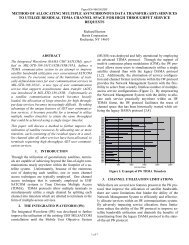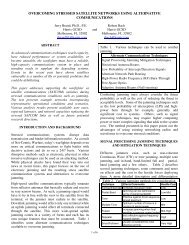harris corporation
harris corporation
harris corporation
You also want an ePaper? Increase the reach of your titles
YUMPU automatically turns print PDFs into web optimized ePapers that Google loves.
Although multi-year contracts may be authorized and appropriated in connection with major procurements, Congress<br />
generally appropriates funds on a fiscal year basis. Procurement funds are typically made available for obligation<br />
over the course of three years. Consequently, programs often receive only partial funding initially, and additional<br />
funds are obligated only as Congress authorizes further appropriations. The termination of funding for a<br />
U.S. Government program would result in a loss of anticipated future revenue attributable to that program, which<br />
could have an adverse impact on our operations. In addition, the termination of a program or the failure to commit<br />
additional funds to a program that already has been started could result in lost revenue and increase our overall<br />
costs of doing business.<br />
Generally, U.S. Government contracts are subject to oversight audits by U.S. Government representatives. Such<br />
audits could result in adjustments to our contract costs. Any costs found to be improperly allocated to a specific<br />
contract will not be reimbursed, and such costs already reimbursed must be refunded. We have recorded contract<br />
revenues based upon costs we expect to realize upon final audit. However, we do not know the outcome of any<br />
future audits and adjustments and we may be required to materially reduce our revenues or profits upon completion<br />
and final negotiation of audits. Negative audit findings could also result in termination of a contract, forfeiture of<br />
profits, suspension of payments, fines and suspension or prohibition from doing business with the U.S. Government.<br />
In addition, U.S. Government contracts generally contain provisions permitting termination, in whole or in part,<br />
without prior notice at the U.S. Government’s convenience upon the payment only for work done and commitments<br />
made at the time of termination. We can give no assurance that one or more of our U.S. Government contracts will<br />
not be terminated under these circumstances. Also, we can give no assurance that we would be able to procure new<br />
contracts to offset the revenue or backlog lost as a result of any termination of our U.S. Government contracts.<br />
Because a significant portion of our revenue is dependent on our performance and payment under our<br />
U.S. Government contracts, the loss of one or more large contracts could have a material adverse impact on our<br />
financial condition.<br />
Our government business also is subject to specific procurement regulations and a variety of socio-economic<br />
and other requirements. These requirements, although customary in U.S. Government contracts, increase our<br />
performance and compliance costs. These costs might increase in the future, thereby reducing our margins, which<br />
could have an adverse effect on our financial condition. Failure to comply with these regulations and requirements<br />
could lead to fines, penalties, repayments, or compensatory or treble damages, or suspension or debarment from<br />
U.S. Government contracting or subcontracting for a period of time. Among the causes for debarment are violations<br />
of various laws, including those related to procurement integrity, export control, U.S. Government security<br />
regulations, employment practices, protection of the environment, accuracy of records, proper recording of costs and<br />
foreign corruption. The termination of a U.S. Government contract or relationship as a result of any of these acts<br />
would have an adverse impact on our operations and could have an adverse effect on our standing and eligibility for<br />
future U.S. Government contracts.<br />
We enter into fixed-price contracts that could subject us to losses in the event of cost overruns or a significant<br />
increase in inflation.<br />
We have a number of firm fixed-price contracts. These contracts allow us to benefit from cost savings, but they<br />
carry the risk of potential cost overruns because we assume all of the cost burden. If our initial estimates are<br />
incorrect, we can lose money on these contracts. U.S. Government contracts can expose us to potentially large<br />
losses because the U.S. Government can hold us responsible for completing a project or, in certain circumstances,<br />
paying the entire cost of its replacement by another provider regardless of the size or foreseeability of any cost<br />
overruns that occur over the life of the contract. Because many of these contracts involve new technologies and<br />
applications and can last for years, unforeseen events, such as technological difficulties, fluctuations in the price of<br />
raw materials, problems with our suppliers and cost overruns, can result in the contractual price becoming less<br />
favorable or even unprofitable to us over time. The United States also may experience a significant increase in<br />
inflation. A significant increase in inflation rates could have a significant adverse impact on the profitability of these<br />
contracts. Furthermore, if we do not meet contract deadlines or specifications, we may need to renegotiate contracts<br />
on less favorable terms, be forced to pay penalties or liquidated damages or suffer major losses if the customer<br />
exercises its right to terminate. In addition, some of our contracts have provisions relating to cost controls and audit<br />
rights, and if we fail to meet the terms specified in those contracts we may not realize their full benefits. Our results<br />
of operations are dependent on our ability to maximize our earnings from our contracts. Cost overruns could have<br />
an adverse impact on our financial results. The potential impact of such risk on our financial results would increase<br />
if the mix of our contracts and programs shifted toward a greater percentage of firm fixed-price contracts.<br />
19
















